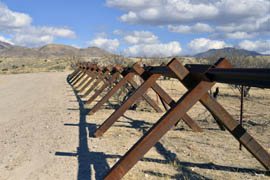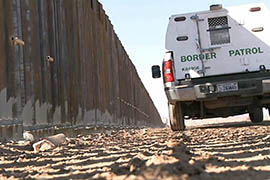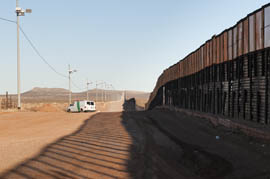Cronkite News has moved to a new home at cronkitenews.azpbs.org. Use this site to search archives from 2011 to May 2015. You can search the new site for current stories.
Illegal immigration shifts to Texas, as overall numbers fall on border
WASHINGTON – Illegal immigration along the Southwest border has shifted to the east in recent years, with Texas seeing a rise in apprehensions while numbers in all the other border states have fallen sharply.
The number of people caught crossing the border illegally in Texas rose from 125,000 in fiscal 2009 to 225,548 as of Sept. 19 – just two weeks before the end of fiscal 2013. That represented an 80.4 percent increase over the five-year period.
By comparison, there were steep declines on the rest of the border, with Border Patrol sectors covering Arizona, New Mexico and California reporting 238,141 fewer apprehensions, a 57.2 percent drop over those years, according to Border Patrol statistics.
Tougher law enforcement in Arizona, a strong Texas economy and a greater number of Central American immigrants choosing the safer and “relatively closer route” through Texas could be driving the shift, experts said.
Mexicans still make up more than half of illegal-entry apprehensions, but their numbers have been shrinking, said Michelle Mittelstadt, communication director for the Migration Policy Institute. As increasing numbers of Salvadorans, Guatemalans and Hondurans try to cross the border, she said, coming through Texas would be a geographically more logical choice.
Pew Research’s Hispanic Trends Project estimated in a report this week that Mexicans made up 52 percent immigrants who were here illegally in 2012, down from 57 percent in 2007.
With fewer Mexicans trying to cross the border, Mittelstadt said there should be less pressure on Arizona. And she does not see a resurgence in Mexican numbers any time soon.
“Central America does not have a population large enough to supplant Mexican migration, and the demographic, educational, and economic trends in Mexico are such that a turnaround in Mexican migration on a large scale remains unlikely,” Mittelstadt said.
It is not surprising that “people would always choose the easiest way they think to come to the country,” said Raquel Rubio-Goldsmith, coordinator of the University of Arizona’s Binational Migration Institute, of the shift toward Texas.
Border Patrol officials declined to speculate on the shift. Douglas Mosier, a Border Patrol spokesman in El Paso, Texas, said in an email that the agency is “currently experiencing higher levels of apprehensions in certain areas” of the Southwest border that it attributed to “historic levels of personnel, technology and resources … as well as innovative prosecutorial strategies” on the border.
A spokesman in the Tucson sector sounded a similar theme, saying in an emailed statement that the Border Patrol in Arizona has nearly doubled its agents, from 2,100 to nearly 4,000 over the last decade. That, along with better technology and work with authorities, has “made the border more secure than ever,” Agent Scott Stewart said.
Some immigration advocates pointed to the latest numbers and said it is time to rethink the Border Patrol policy.
With illegal crossings at a historical low, “it does not make any sense to spend more money on continued operating that would cause hundreds of deaths,” said James Lyall, staff attorney with American Civil Liberties Union of Arizona.
Lyall said that “investing millions of dollars on a continued exponentially growing” border patrol is a questionable policy when illegal crossings are at a historical low.
But Jessica Vaughan, director of policy studies at the Center for Immigration Studies, said the drop of apprehensions in Arizona proves that tougher enforcement works and should be expanded.
But Rubio-Goldsmith said she does not think current policies – or their expansion – can do much to stem the flow. No matter what extreme condition illegal border crossers face, “there are still hundreds of thousands coming to the country desperately every year,” she said.









